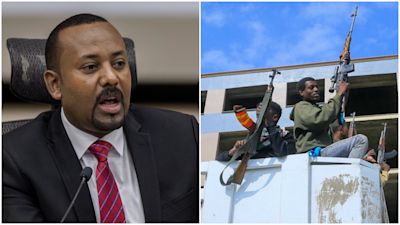Tigray crisis: Facebook deletes Ethiopia PM's post urging citizens to take up arms 'and bury' rebels

ITV News Correspondent John Ray reports on the escalating war in northern Ethiopia
Facebook has taken down a post from Ethiopia's prime minister for breaching its rules against inciting violence, as the humanitarian crisis plaguing the conflict-ridden country deepens.
On Sunday, Abiy Ahmed appealed to citizens to take up arms to halt the advancing Tigray People's Liberation Front (TPLF), a group of rebel fighters who have waged a year-long offensive against state forces.
A state of emergency was imposed after the TPLF claimed to have captured several towns in recent days.In a Facebook post, Mr Abiy called on citizens to "organise and march through [any] legal manner with every weapon and power... to prevent, reverse and bury the terrorist TPLF", according to a translation of the statement.
Reacting to the post, a spokesperson for Facebook, which has recently changed its name to Meta, said the statement had been removed for violating its policies "against inciting and supporting violence".
"At Meta, we remove content from individuals or organisations that violates our Community Standards, no matter who they are," the spokesperson told the BBC.
The war in the northern Tigray region of Ethiopia broke out last November after the TPLF rejected political reforms and Mr Abiy ordered a military offensive against regional forces in Tigray.
The Ethiopian prime minister allowed soldiers from neighbouring Eritrea to invade Tigray and join Ethiopian forces in fighting the Tigray forces who had long dominated the national government before he took office.
The TPLF says its aim is to break a siege of the northern region.
The United Nations human rights chief Michelle Bachelet says the war has been marked by “extreme brutality” that could amount to war crimes and crimes against humanity.
“The Tigray conflict has been marked by extreme brutality. The gravity and seriousness of the violations and abuses we have documented underscore the need to hold perpetrators accountable,” Ms Bachelet said.
It came as a joint investigation into alleged atrocities found all sides had committed abuses.
Thousands of people have been killed in the conflict, while millions have been displaced and hundreds of thousands are facing famine conditions, according to the UN.
The report, a rare collaboration by the UN human rights office and the government-created Ethiopian Human Rights Commission, was released a day before the war’s one-year milestone as Tigray forces threaten the capital, Addis Ababa.
The rebels have reportedly captured the strategic towns of Dessie and Kombolcha in Amhara state, just over 186 miles north of the capital.
In western Tigray, claimed by forces from the neighbouring Amhara region, "it was apparent that the Tigrayans had left most of the areas, as it was difficult to find Tigrayans to interview,” the report states.
The investigation found that several Ethiopian military camps were used to torture captured Tigray forces or civilians suspected of supporting them.
Others were said to have been detained in “secret locations” and military camps across the country, with arbitrary detentions in many cases.
The more than 1,300 rapes reported to authorities are likely far fewer than the real number committed, the investigation's findings add.
Ethnic Tigrayans across the country have reported being targeted with arbitrary detentions, while civilians in Tigray have described famine and mass expulsions.
Tigray forces detained some ethnic Amhara civilians in western Tigray in the early days of the war on suspicion of supporting the military, and in some cases tortured them.
The prime minister’s office said in a statement that the report “clearly established the claim of genocide as false and utterly lacking of any factual basis”.
The statement noted “serious reservations” about the report but claimed it laid “sinister allegations to rest”.
Ethiopia’s government imposed a blockade on Tigray since the Tigray forces regained control in June, cutting off almost all access for commercial goods and humanitarian aid.
That followed large-scale looting and destruction of food and crops across the region that “has had a severe socioeconomic impact on the civilian population”, the report says.
The joint investigation, based on more than 260 interviews with victims and witnesses, said it had received no response from Eritrea’s government or from Amhara regional officials.